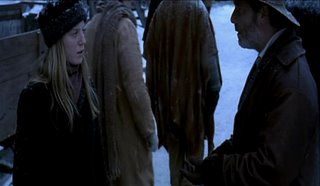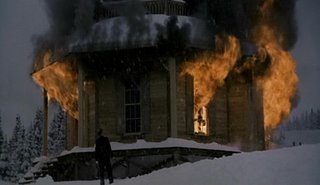The setting is California in 1869, an era when the lure of gold had seized many. It's also an era where America was being opened up by rail, and the presence of the railroad could turn a little village into a boom town.
The film opens in the small town of Kingdom Come, and the arrival of 2 groups who will tear the fabric of the town apart. One of the groups is a group of railway surveyors, led by a young man named Dalglish (Wes Bentley). They are there to determine the route that the rail line will take. The other group is less conspicuous at first - A dying woman (Nastassia Kinski) and her young daughter Hope (Sarah Polley)
Very early on, the film makes reference to a Mister Dillon, and the implication is that he is a big wheel in town. Just how big is demonstrated when one miner is caught robbing another, and is sentenced to a public whipping. The charges are read to the onlooking crowd, and it's stated that the sentence is fifty lashes, but this is commuted to twenty-five by Dillon "Because he knows it will never happen again." Dillon himself carries out the punishment. This sequence alerts us that Kingdom Come is not a town like any other - That it is in fact owned and ruled by one man.
After the whipping has concluded, young Hope rushes up to Dillon and presses a rosary into his hand. Stunned, he blurts out "Hope?"..."Are you Hope?"

What's going on here? Well, we got a clue when the dying mother Elena pointed Dillon out to Hope from the hotel window prior to the whipping, but now we find Dillon going alone to an isolated old shack, and the film switches to a flashback sequence. We see a young couple with an infant struggling through a blizzard ,and coming upon a single shack in the snow. They are invited in, and discover that the occupant is a prospector, who has found gold but is desperately lonely. Fueled by too much alcohol, the young man makes a startling trade - His wife and child for the other man's claim.
If this plotline sounds familiar, it should. It's a re-working of Thomas Hardy's "The Mayor of Casterbridge", where a man named Michael Henchard sells his family to a sailor for 5 guineas. The Claim is at it's best when it stays with Dillon, who is played by a terrific, but little-known actor named Peter Mullan. Despite the ghastly secret he carries around, Dillon is essentially a good man, and when he is confronted by his past, he tries to make restitution for it. He brings a house for the two women to live in and arranges for medical treatments for the mother. He even remarries Elena. Dillon also has a couple of conversations with the mother, where he discovers that Hope doesn't know the truth about her past.
In the meantime, there is the issue of the railway, and a parallel plot follows Dalglish and his men as they survey the surroundings. Dillon, of course, fully expects the the railroad to go through Kingdom Come, and makes ominous statements to that end. It eventually becomes evident to Dalglish that thay will have to choose another route, and there is a small scene with a railroad executive where he basically says that there could be bloodshed when Dillon finds out. He is told to "Do whatever you have to" , and he silently agrees.
It has long been a pet peeve with me for films to give me one dimensional characters. That is, Character X is a bad guy...and that's all he is. In this film, things are a bit fuzzy. We already know about Dillon, but we start to look at Dalglish a bit differently now, as well. He and his men come back into town brandishing guns, and a confrontation seems unavoidable. It is to the film's credit that it doesn't degenerate into a big gunfight. People do die, yes, but the violence is sudden and minimal, and then things move past it.
The film now swings back to Dillon and the two women. Elena finally succumbs to her illness, and Dillon faces the prospect of losing his daughter once again. Up until this point, Hope has been lukewarm towards Dillon. She doesn't understand why her mother married this guy so hastily. Finally Dillon takes her to the small shack and shows her an old photo of the three of them. When she still doesn't get it, he asks her who is in the photo.
She replies: "It's you"
Mullan is simply marvelous here, as Dillon finally delivers the truth in his blunt Irish brogue.
"The baby is you. The woman is your mother"...."I sold you"......"I sold you both for gold"......"Right here in this hut."

The final passenges of The Claim are simply put, beautiful. Dillon goes back to the town that he built up from nothing and torches the whole thing. The film lingers as the flames lick up and over the wood frame buildings and they eventually crash into soot. The same is true of the man. Dillon sold his family for a dream of wealth and achieved wealth beyond his wildest dreams. All of his riches turned to ash, however as Hope ran out of that little hut.
The cinematographer on the film is a man named Alwin Kuchler, and it would be criminal not to mention his name in a discussion of the film. The snowy outdoor sequences were filmed near Calgary, Alberta, and they are breathtaking.
No comments:
Post a Comment